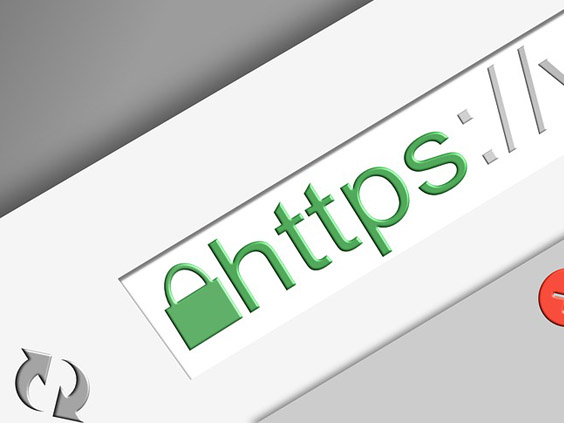Some of you may know what SSL is and maybe some of you have not heard of this term. In the world of websites, SSL has become the most important part of the website. There are a few things to know about SSL in particular when it comes to security. For those of you who are not familiar with this term, here we will discuss the meaning, types and of course the benefits of SSL for your website.
In Google Chrome, maybe you have seen when you enter a certain URL there is a secure and not secure label next to the address bar in Google Chrome. When the SSL certificate is not installed, the browser will label the website as not secure, this is very important for website owners to give credibility to the user that a site labeled secure will guarantee a sense of security.

1. What is SSL Certificate
SSL or Secure Socket Layer is one of the components that must be owned in order to provide a sense of security when the requested data is being processed in network traffic, because the data will be encrypted and the browser will label a website with a lock icon or secure.
When this component is installed, the site will automatically change to the HTTPS protocol which was previously only HTTP. Have you ever heard of the term TLS? TLS is actually the same as SSL, which both protect and encrypt data.
SSL is actually deprecated and has been replaced by TLS. TLS is much better than SSL because it is newer. But don't worry, they both aim to protect the website.
2. How does SSL Certificate work
Broadly speaking, the way this component works is to help sites secure information from computers connected to the internet through special certificates.
Data exchange that occurs when requesting data, email or buying goods online, all data will be encrypted and protected from irresponsible people.
Usually, certificates in this component have 2 types, namely private key and public key. The private key is used to decrypt the data into a format that can be reused by the recipient and the public key is used to encrypt the data to be sent.
3. Types of SSL Certificate
There are several types of SSL that you need to know to meet data security on the website, including:
1. Domain Validated (DV)
This type of SSL is perfect for developing sites that require data encryption at a fairly affordable price.
This type of certificate requires only DNS and email, and only displays information that is secure and encrypted. This Validated Domain Certificate (DV) is strongly discouraged for owners of e-commerce sites or online stores.
2. Organization Validated (OV)
SSL OV is actually not much different from the DV type, but what makes the difference is that the domain owner is required to verify by showing proof of ownership of the domain certificate or Certificate Authority such as Comodo or GeoTrust.
This is to ensure that the domain is registered from a business name, business location or other information. The Organization Validated (OV) type is usually used by companies or organizations so that their websites are safe and more trusted to users.
3. Extended Validated (EV)
This type of SSL has a very high level of security and is highly recommended for use in online stores or e-commerce. This EV certificate provides information regarding the business name with a green marked in the URL bar indicating that the site is highly secure.
To use this type of Extended Validated (EV), several legal documents are needed to verify domain ownership, because usually this type of certificate is used for domain owners with business entities such as state departments and etc.
4. What are the benefits of using SSL
Some of the benefits when your website is installed with SSL or TLS include:
1. Secure when exchanging data
The benefit that is felt when using an SSL certificate is that protecting data is more secure with a public key and private key, when exchanging data that occurs between visitor computers when visiting your website.
2. SEO is much better
Since 2014, Google has set an algorithm that prioritizes websites that have an SSL certificate over those that don't have a certificate at all. This has resulted in increased reputation and quality of SEO.
Although this component is not the number one factor assigned by Google, it would be nice to use this component for data security.
3. Reputation increases
Websites that do not use SSL have a high chance of not being accessed by the user, because the browser provides information to the user that the website is not safe to visit.
This is very dangerous if a business site or online store does not use an SSL or TLS certificate, most likely the user will not access the website. It's a good idea to install this security certificate as soon as possible when you're just starting to build a website to improve the reputation itself.
5. Change the Protocol from HTTP to HTTPS
HTTP and HTTPS are protocols that function to send information from one computer to another over the internet. The difference between HTTP and HTTPS lies in the end of the letter which adds the letter S, which is Secure.
Websites that have an SSL certificate installed will usually automatically change to HTTPS. The change in protocol from HTTP to HTTPS indicates that the HTTP protocol is an insecure protocol because it does not encrypt data. HTTP does not authenticate when interacting with other computers on the internet network. This is very risky from hackers who are ready to save your data.
HTTPS is a secure protocol because it has a special certificate installed. This indicates that the computer has authenticated with another computer to ward off anything that is trying to be stolen or misused. As the owner, of course this is very important in interacting with website users such as in e-commerce or online stores.
Exchange of information such as email, address information, balance, personal data is much more secure with this component.
Conclusion
After we understand the meaning, workings, benefits and types of SSL, please note that there are paid certificate types and there are also free ones such as Let's Encrypt or Cloudflare.
Of course the features offered are different, free SSL is perfect for those who want to experiment before using a paid certificate type. The DV (Domain Validated) type certificate is very suitable for developing websites, then the OV (Organization Validated) certificate type is very suitable for domain ownership related to information, company or organization names and the last type, EV (Extended Validated) is suitable for running websites such as e-commerce or online stores because of the high level of security.

